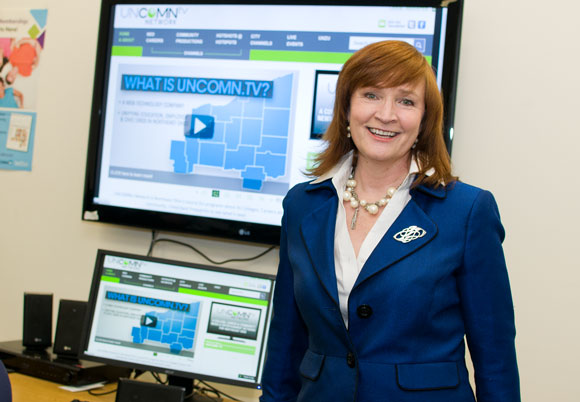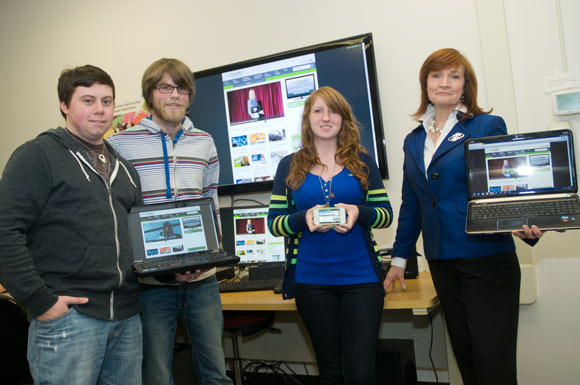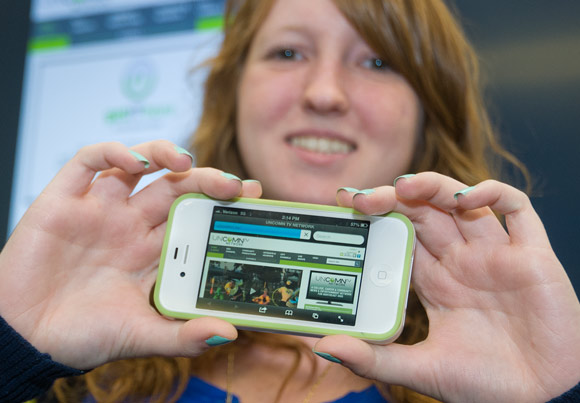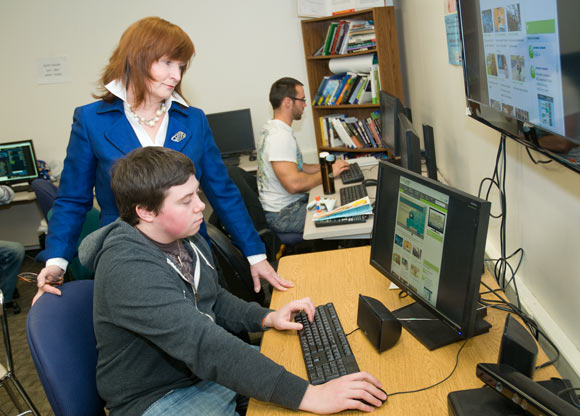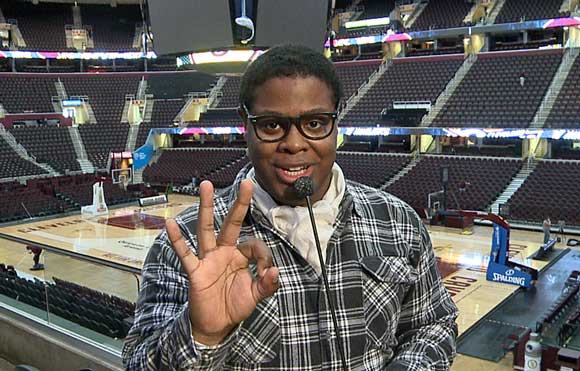online resource unites region's agencies to help bridge the education-to-employment gap
Imagine having an online resource with all the information you need to custom design your own career path.
That’s exactly what the UNCOMN.TV does. This robust resource brings together educational institutions, workforce programs, employers and community organizations into a single site. This collaboration identifies what employers need in employees, what educators need to teach for job preparedness, and what students need to be doing to get these jobs. In concert, these entities are helping to turn brain drain into brain gain.
Founder Barbara Oney came up with the idea for the network in 2005, while working as chief marketing officer for the Cleveland convention and visitors bureau. She observed the creation of new industry clusters in the area -- and with them new jobs -- while at the same time seeing new college grads and young professionals flee the region. There was a divide between new job openings and the students who were looking for jobs.
“I was seeing a huge disconnect," recalls Oney. "There were jobs being developed, but students and young professionals were unaware they were there. I saw there was no effective way of marketing and communicating the opportunities. I dug deeper and realized there was a huge need to better connect our employers, civic community and educators in a much more dynamic fashion.”
After spending two years researching employment strategies and patterns around the country, Oney officially launched UNCOMN.TV (pronounced uncommon TV) last year. She has been growing the site ever since.
The latest program Oney is creating takes the career search to new levels by leveraging technology and bringing together parties crucial to the economic success of the region: area high schools, colleges, employers and support organizations.
Oney explains that there are jobs in the region, but employers are reporting that recent grads don’t have the right skills for the jobs. Oney wants to “bridge the education-to-employment gap” with UNCOMN.TV’s new ARC (Attract, Retain, Connect) Technology. Oney plans to roll out ARC by the end of the year with the help of a $25,000 Third Frontier grant.
“The business community is moving so rapidly and transforming so quickly,” says Oney. “The educational system has to understand what the skills are for employment.”
The ARC platform aims to attract skilled employees to jobs in Cleveland; retain local talent; and connect educators and employers to help identify worker skill gaps and employer skill needs through predictive data analytics.
“It calls upon the business community to participate with us in helping to shape and direct the talent they are subsequently going to hire,” says Oney. “We create the ability to really start educating people about industries so they can make decisions about career paths.”
UNCOMN.TV’s new technology will allow organizations and individuals to sign up for their own knowledge network pages with content specific to users’ individual interests.
Content can be anything from articles and press releases to videos and podcasts. “You would be getting information you would have no other way of getting, and it would be different than what I’m getting,” explains Oney. “UNCOMN.TV provides an online smart community information exchange platform -- enabling communication among employers, educators, students and employees that will drive employment and career growth.”
Until now, UNCOMN.TV has been all about simply informing users about industries and careers in the region. The ARC program will enable individuals to find position and fill jobs. “We have been receiving wonderful enthusiasm for this next stage and are in active discussions with various leading workforce and economic development organizations along with educational institutions to partner with us in the roll-out,” says Oney.
What Oney has done with UNCOMN.TV has grabbed the attention of the region’s economic development organizations as well as future employees. Within the first month of its release, UNCOMN.TV had 30,000 visitors across 1,265 cities and 66 countries. Oney is now concentrating on conducting live streams onto college campuses to continue educating students about Northeast Ohio businesses. “Our focus is on industry-leading conferences where we can feature keynote speakers and stream them live into the colleges,” she says. “It’s being watched across the country, so we’re getting all sorts of exposure for Northeast Ohio.”
During last year’s Manufacturing Expo, the site had 609 visits (more than 59 percent new visits) from 20 states and four colleges. During NEOSA’s IBM LiveStream, UNCOMN.TV had a total of 88 streams from five colleges and 13 states.
Other successes in UNCOMN.TV programming include Got City GAME, an online interactive game show, filmed by Tri-C students, with trivia about Cleveland’s industry, education, civic history and architecture and city challenges that took contestants to different locations within the city.
Launched in 2009 with a $30,000 Civic Innovation Lab grant, the show was a hit -- watched not only in Cleveland but around the world. “This show was developed to test various concepts I had about how to engage the community and build viral outreach,” says Oney “Our next step was to develop a more expansive and sustainable model the entire community could participate in on an ongoing basis.” The second season, which will include Akron and Youngstown, is scheduled to start later this year.
Oney has also brought UNCOMN.TV to high school students with UNZU (UNified-community Zip-Unit), a career education tool showcasing Northeast Ohio industries in demand. Oney tested UNZU last spring with the Northeast Ohio Regional Information Technology Engagement (RITE) Board, a collaboration between local colleges and NEOSA, and 150 students in the West Shore Career-Technical Education District.
Students spent an average of 22 minutes on the site and one third came back for a second visit. UNZU was recently distributed to Lakewood High School, Rocky River High School, Harding Middle School and Garfield Middle School.
Courtney DeOreo, administrator of the RITE Board, sees the partnership with UNCOMN.TV as a critical tool in shaping high school students’ career decisions. “Career development is not just an event, it’s a process,” she says. “When students are starting to make decisions about what they want to do, we need to reach out to them.”
The UNZU program appeals to middle and high school students. “The amount of time they’re spending on the site has been encouraging,” says DeOreo. “It’s very high-tech, high-touch. It’s interpersonal and face-to-face. When career choice makes a difference it’s not enough to go in one time and say, ‘IT jobs are cool -- go into it and get a good job and it will be great.'"
Photos Bob Perkoski except where noted


